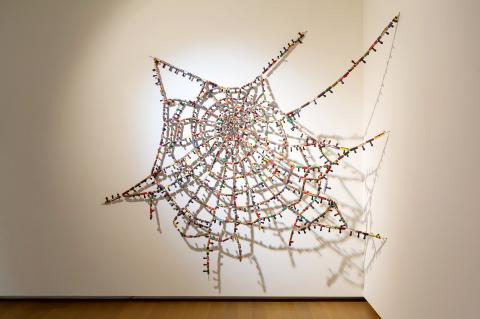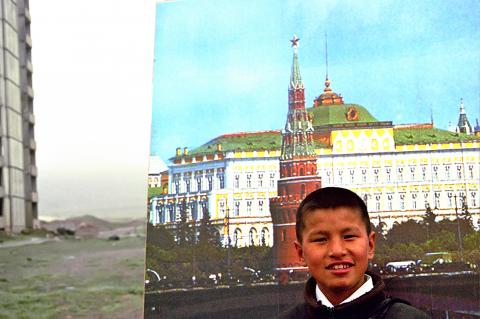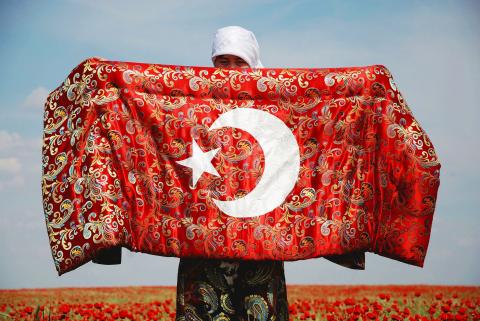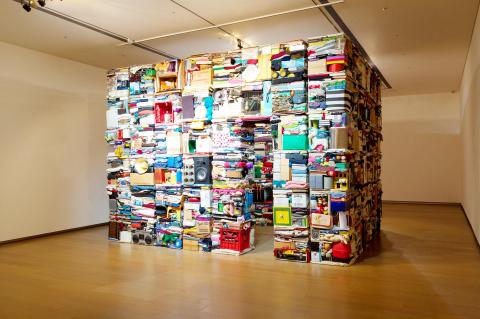In a recent opinion piece in Art+Auction titled Why Art Galleries Matter, Dorsey Waxter called on collectors and investors, flaneurs and aesthetes to forego biennials and art fairs and spend more time at local galleries as they are the engines that drive the whole art enterprise. It’s good sense.
With No-Mad-Ness in No Man’s Land, currently on view at Eslite Gallery (誠品畫廊), US-based curators Leeza Ahmady and Ombretta Agro Andurff have assembled an exceptionally clear-sighted group show notable for its thematic coherence and concise execution. Five years in the making from idea to execution, it counts as one of the best shows in Taipei this year.
The curatorial idea is nomadism, with all its broad contemporary connotations of movement, madness and marginalization, and cognate notions of migration, diaspora and borders. Ahmady and Andurff possess a delicate touch and approach the topic with detachment, intelligence and humor. Even when touching on potentially explosive issues, the show wears its politics lightly. And yet the exhibition — which includes 10 artists from eight countries, including Palestine, the Philippines, Uzbekistan, Lebanon, Afghanistan, India, Kazakhstan and Israel-Palestine — remains as much a cultural investigation of these under-represented countries as it is an aesthetic experience.

Photo courtesy of Eslite Gallery
Andruff told the Taipei Times that the chosen artists, many of whom have represented their countries at the Venice Biennale and Documenta, are “deeply rooted in their own culture but use recognized iconography that everyone can understand.” The employment of local imagery to speak in a global voice is the key to unlocking the entire show.
This is most clearly manifested in Yelena and Viktor Vorobyev’s Knife, a park bench-sized sculpture in the shape of a kitchen knife made from wood and stone. Seen on the gallery floor, it appears a throwaway emblem, large and inert. Its deceptive simplicity, however, is pregnant with associations: the hunt and the hearth, the secure and the violent, the domestic and the predatory, the masculine and the feminine. It is such a well-crafted tactile object that one is tempted to touch it, run a finger along its jagged blade. A tool of power, yet of domestication and, in our day — with its Michelin stars and plastic surgery — rarefied skill, the object evokes a tangent along which we can imagine the development of society from hunter-gatherer to the sedentary lifestyle found in today’s advanced countries.
Reena Saini Kallat works in a similar kind of duality, but here moves beyond nomadism into the realm of border crossings. In Untitled (Cobweb Knots and Crossings), Kallat, from India, affixes together hundreds of rubber stamps emblazoned with national flags to form the shape of a web. The object can be a trap, the individual entangled in bureaucratic network of officialdom, or a home.

Photo courtesy of Eslite Gallery
Borders and migration are themes picked up by Isabel and Alfredo Aquilizan, an Australia-based Filipino husband and wife. Their Address is a monumental installation in the shape and size of a roofless shack, assembled from 140 boxes that contain all manner of household objects — clothing, toys, board games, fans and computers — that the artists have accumulated over the years. It serves as a powerful symbol of the Filipino diaspora, the objects are memories a family gathers over a lifetime of movement.
There is much else to see here and though the theme might be broad, it is never derivative. Sharif Waked’s video of a donkey forced to undergo a shower to remove its zebra stripes in Bath Time, is an amusing statement about identities immigrants undergo and have to strip in a new land.
One gains the sense over the past few years that Taipei’s galleries are cluing in to the importance of reaching out to international artists and curators. Hopefully, exchanges will result from this. And what is remarkable here is that they are doing so while moderating the rarefied language that has become de rigeur of public museums. No-Mad-Ness in No Man’s Land is a fine example of how a commercial gallery can successfully work with international curators and artists. Let’s hope to see more of this in the future.

Photo courtesy of Eslite Gallery
■ No-Mad-Ness in No Man’s Land runs until Dec. 22 at Eslite Gallery (誠品畫廊), 5F, 11 Songgao Rd, Taipei City (台北市松高路11號5樓), tel: (02) 8789-3388 X1588. Open Tuesdays to Sundays from 11am to 7pm.

Photo courtesy of Eslite Gallery

As Taiwan’s second most populous city, Taichung looms large in the electoral map. Taiwanese political commentators describe it — along with neighboring Changhua County — as Taiwan’s “swing states” (搖擺州), which is a curious direct borrowing from American election terminology. In the early post-Martial Law era, Taichung was referred to as a “desert of democracy” because while the Democratic Progressive Party (DPP) was winning elections in the north and south, Taichung remained staunchly loyal to the Chinese Nationalist Party (KMT). That changed over time, but in both Changhua and Taichung, the DPP still suffers from a “one-term curse,” with the

Jan. 26 to Feb. 1 Nearly 90 years after it was last recorded, the Basay language was taught in a classroom for the first time in September last year. Over the following three months, students learned its sounds along with the customs and folktales of the Ketagalan people, who once spoke it across northern Taiwan. Although each Ketagalan settlement had its own language, Basay functioned as a common trade language. By the late 19th century, it had largely fallen out of daily use as speakers shifted to Hoklo (commonly known as Taiwanese), surviving only in fragments remembered by the elderly. In

William Liu (劉家君) moved to Kaohsiung from Nantou to live with his boyfriend Reg Hong (洪嘉佑). “In Nantou, people do not support gay rights at all and never even talk about it. Living here made me optimistic and made me realize how much I can express myself,” Liu tells the Taipei Times. Hong and his friend Cony Hsieh (謝昀希) are both active in several LGBT groups and organizations in Kaohsiung. They were among the people behind the city’s 16th Pride event in November last year, which gathered over 35,000 people. Along with others, they clearly see Kaohsiung as the nexus of LGBT rights.

In the American west, “it is said, water flows upwards towards money,” wrote Marc Reisner in one of the most compelling books on public policy ever written, Cadillac Desert. As Americans failed to overcome the West’s water scarcity with hard work and private capital, the Federal government came to the rescue. As Reisner describes: “the American West quietly became the first and most durable example of the modern welfare state.” In Taiwan, the money toward which water flows upwards is the high tech industry, particularly the chip powerhouse Taiwan Semiconductor Manufacturing Co (TSMC, 台積電). Typically articles on TSMC’s water demand